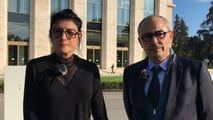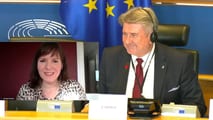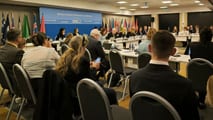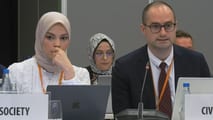
Between an unprecedented gathering in Paris in support of persecuted Christians and the appeal of 86 senators to protect Christians in France “like all other believers,” the reality of anti-Christian hatred can no longer be ignored. On the front line, the European Centre for Law and Justice (ECLJ) is fighting this phenomenon at the European level and mobilizing from Paris to the United Nations in Geneva.
An Unprecedented Gathering in Paris to Support Persecuted Christians in France and Worldwide
More than 1,500 people gathered in Paris on Sunday, 28 September 2025, to express their support for persecuted Christians in France and around the world. The initiative, unprecedented in scope, came from two young Christian influencers, one Roman Catholic and the other Coptic Orthodox. It aimed to pay tribute to Ashur, an Iraqi Christian brutally murdered in Lyon while live-streaming his testimony of faith on TikTok. Paralyzed since childhood and in a wheelchair, he had fled Iraq in 2014, threatened like so many other Christians by the Islamic State.
This mobilization, supported by Pastor Saïd Oujibou, a Christian convert from Islam, and by the European Centre for Law and Justice (ECLJ), raised questions about the lack of strong reactions to the persecution of 380 million Christians in 72 countries. The alarm was echoed at the UN on 29 September 2025 by Archbishop Paul Richard Gallagher, the Holy See’s Secretary for Relations with States: “The data show that Christians are the most persecuted religious group worldwide, and yet the international community seems to turn a blind eye to their situation.” A persecution that now extends even to historically Christian lands such as France?
A Call on French and European Authorities to Protect Christians
In its intervention at the gathering, the ECLJ called on French and European authorities to recognize anti-Christian hatred in Europe and to provide specific protection for Christians. Believers themselves, whether victims or witnesses of anti-Christian crimes, were urged to come forward to church authorities, law enforcement, and civil society. “Everyone must play their part in reporting anti-Christian crimes: otherwise, the authorities will never be able to grasp the scale of the phenomenon or respond effectively.”
Double Standards of Indignation
Church arson, desecrations, assaults, thefts of liturgical objects: anti-Christian crimes are increasing rapidly amid a form of indifference that contrasts with the attention given to attacks against the faithful of other religions. These “double standards of indignation” were denounced by 86 French senators in an op-ed calling on the Republic to protect Christians “like all other believers.” They stressed that “Christians in France too often feel abandoned” and urged “the government to act without delay.”
At the same time, the decision by SNCF and RATP to ban an advertising campaign for the film Sacré-Cœur—deemed too “confessional and proselytizing” and “incompatible with the principle of neutrality of public service”—once again illustrated the sidelining of Christianity from public space. A situation all the more paradoxical as, at the very same time, the Eurometropolis of Strasbourg was running a public campaign for the International Day of Older Persons featuring the image of a veiled woman.
The ECLJ Alerts the United Nations
Against this backdrop, on 30 September 2025 the ECLJ submitted an official contribution to the United Nations High Commissioner for Human Rights on the situation of Christians in Europe, who are increasingly victims of intolerance, negative stereotyping, stigmatization, discrimination, incitement to violence, and violent attacks. The ECLJ recalled that the visible and sometimes bloody violence against Christians must be understood in the context of what Pope Francis has called “polite persecution,” “disguised as culture, modernity and progress.”
Anti-Christian Revisionism: the “Polite Persecution” of Christians in Europe
Anti-Christian revisionism, carried forward by laicist and far-left activists, does not only target Christian symbols in public space: it also undermines fundamental freedoms. Public prayer, even alone, standing, and in silence, is prohibited; conscientious objection to abortion or euthanasia is disregarded; parents are unable to shield their children from a sexuality education programme that makes consent and desire the sole axioms of morality.
In universities and the workplace, expressing a Christian conviction on Islam, abortion, marriage, or sexuality often exposes believers to mockery, exclusion, disciplinary risk, or even legal proceedings. These pressures, less visible than physical violence, create a climate of self-censorship among Christians. This gradual shift reflects an intent to erase Christianity as a legitimate reference point in European public life, criminalizing any expression that draws upon it, even though it constitutes he bedrock of Europe’s civilization.
The ECLJ Mobilizes European Civil Society to Press Institutions to Act
In response to the rise of anti-Christian hatred in Europe, the ECLJ has taken the initiative to form a coordination of around ten national and European NGOs to share experiences and strengthen the effectiveness of advocacy efforts. This collective mobilization pursues a clear objective: that the protection of Christians be fully integrated into the priorities of States and of the European Union, on the same footing as measures already established for Muslims and Jews. The ECLJ thus contributes actively to the work of the European Parliament Intergroup on Freedom of Religion or Belief, where it gives a voice to Christian communities too often marginalized in institutional debates.













